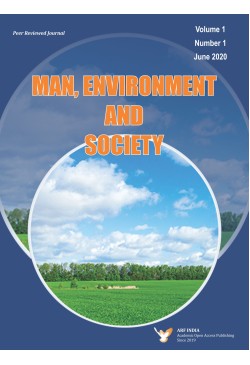
Man, Environment and Society
Frequency :Bi-Annual
ISSN :2582-7669
Peer Reviewed Journal
Analysis of Water Pollution with Special Reference to Physio-Chemical Parameters and It’s Corresponding Impact on Social Being
Toti Jharna (Waterfall): Host-Guest Perspectives of an Off-beat Rural Tourist Destination in Jharkhand, India
Monu, R.K., & Chatterjee, D. (2023). Toti Jharna (Waterfall): Host-Guest Perspectives of an Off-beat Rural Tourist De4stination in Jharkhand, India, Man, Environment and Societys, 4(1), pp. 23-46. DOI:10.47509 /MES.2023.v04i1.02
Ecological Alienation of West Bengal’s Buxa Hill Residents in Alipurduar Area: An Assessment of the Environmental Development Process
Fertility Transition among Black South African Women: Do Contextual Influences Matter?
Monpa Worldview and Resource Management